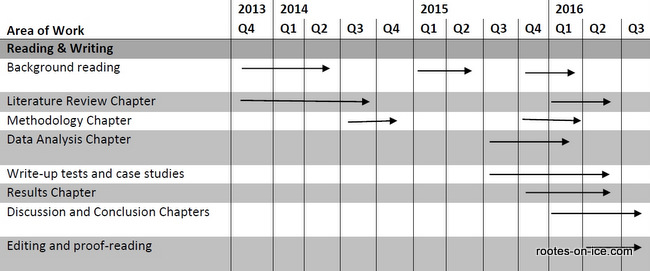
Feb 16, · Structure and format of the expository essay. When considering how to structure an expository essay, you may wish to take out a pen and paper and do an outline straight off the bat. This will help to keep you on the right path and give you a template that will show you how to start An expository essay is an essay that requires to examine a specific topic and give arguments. It involves a presentation of the main thought in a clear manner using the contrast and comparison and including the relevant examples and explanations of certain phenomena The Five-Paragraph Essay. The safest way to write an essay would be by following the five-paragraph rule. This could be used when writing to convince or prove a point as it
Expository Essay: How to Write, Structure, Format and Examples
Last Updated: December 23, References Approved. This article was co-authored by Alexander Peterman, MA. Alexander Peterman is a Private Tutor in Florida. He received his MA in Education from the University of Florida in There are 10 references cited in this article, which can be found at the bottom of the page, expository essay samples. wikiHow marks an article as reader-approved once expository essay samples receives enough positive feedback.
This article has been viewedtimes. Expository essays are often assigned in academic settings. In an expository essay, you need to consider an idea, investigate the idea, then explain the idea. Some expository essays may include an argument, while others are purely expository essay samples. Before you write an expository essay, take some time to jot down ideas for your essay.
Try the clustering method by writing a brief explanation of your subject in a bubble in the center of your page. Then, draw 3 or more lines extending from the circle and jot down idea bubbles that connect to your main theme. Make sure to begin your outline with an engaging introduction sentence. After the introduction sentence, provide some background information and include your thesis statement, which is your main argument.
To learn how to use transitions in your essay, read more from our Writing co-author. Did this summary help you? Yes No. Log in Social login does not work in incognito and private browsers. Please log in with your username or email to continue, expository essay samples. wikiHow Account.
No account yet? Create an account. Community Dashboard Write an Article Request a New Article More Ideas Edit this Article. Courses New Skills for Work New Get a Dating Coach New Expert Videos About wikiHow Pro Upgrade Sign In.
Home Random Browse Articles Courses New About wikiHow Easy Ways to Help Approve Questions Fix Spelling Quiz App More Things to Try We use cookies to make wikiHow great. By using our site, expository essay samples, you expository essay samples to our cookie policy. Cookie Settings, expository essay samples. wikiHow is where trusted research and expert knowledge come together.
Learn why people trust wikiHow. Download Article Explore this Article parts. Sample Essay Conclusion. Tips and Warnings. Related Articles. Article Summary. Co-authored by Alexander Peterman, MA Last Updated: December 23, References Approved. Sample Essay Conclusion Sample Expository Essay Conclusion.
Support wikiHow and unlock all samples. Part 1 of Define your purpose for writing. Think about expository essay samples you are writing an expository essay, expository essay samples. Jot down some of the reasons why you are writing an expository essay and what you hope to do with your completed essay. Ask your instructor if anything seems unclear. Consider your audience. Think about who will be reading your expository essay, expository essay samples.
Consider the needs and expectations of your readers before your begin writing. Jot down some of the things that you will need to keep in mind about your readers as you write your expository essay, expository essay samples. Generate ideas for your expository essay.
Before you begin writing your essay, you should take some time to flesh out your ideas and get some things down on paper. Invention activities like listing, freewriting, clustering, and questioning can help you to develop ideas for your expository essay. List all your ideas for your expository essay. Then look over the list you have made and group similar ideas together. Expand those lists by adding more ideas or by using another prewriting activity.
Write nonstop for about 10 minutes. After you finish writing, expository essay samples, review what you have written, expository essay samples. Highlight or underline the most useful information for your expository essay. Repeat the freewriting exercise using the passages you underlined as a starting point. You can repeat this exercise many times to continue to refine and develop your ideas.
Write a brief explanation of the subject of your expository essay on the center of a piece of paper and circle it. Then draw three or more lines extending from the circle. Write a corresponding idea at the end of each of these lines.
Continue developing your cluster until you have explored as many connections as you can. Respond to each question in as much detail as you can. Make an outline. Once you have gotten some of your ideas on paper, you may want to organize those ideas into an outline before you begin drafting your essay. You can draft an outline to plan out your whole essay, develop more ideas, and figure out if you have forgotten anything. Find appropriate sources. See your assignment guidelines or ask your instructor if you have questions about what types of sources are appropriate for this assignment.
Books, articles from scholarly journals, magazine articles, newspaper articles, and trustworthy websites are some sources that you might consider using. Evaluate your sources to determine their credibility before you decide to use them. There are several things that you will need to consider in order to determine whether or not a source is trustworthy.
Think about what qualifies this person to write about their subject, expository essay samples. If the source has no author or the author does not have adequate credentials, then this source may not be trustworthy. If the author has provided few or no sources, then this source may not be trustworthy. Think about whether or not this author has presented an objective, well-reasoned account of the topic.
If the author seems to value a particular argument or slant that is not supported or only thinly supported by fact, then this source may not be trustworthy. If you are still concerned about a source, cross check some of its information against a trustworthy source.
Read your sources well. Make sure that you expository essay samples what the author expository essay samples saying. Take time to look up words and concepts that you do not understand. Otherwise, you might end up misreading and misusing your sources. Take notes while your read your sources. Highlight and underline significant passages so that you can come back to them. As you read, take note of significant information in your sources by jotting the information down in a notebook.
Write down the publishing information of each source. You will need this information for your "References," "Bibliography," or "Works Cited" pages. Format this page according to your instructor's guidelines, expository essay samples. Develop your tentative thesis. Effective thesis statements express the main focus of a paper and state an arguable claim. A thesis is often one sentence in length but may be longer depending on your topic and the detail of expository essay samples essay.
Do not state facts or matters of taste. For example, "George Washington was the first president of the United States," is not a good thesis because it states a fact. Likewise, "Die Hard is a great movie," is not a good thesis because it expresses a matter of taste. In other words, expository essay samples, avoid just saying that something is "good" or "effective.
Expository essay samples 2 of Begin with an engaging sentence that gets right into your topic. Your introduction should immediately begin discussing your topic.
Expository Essay example
, time: 4:14How to Write an Expository Essay: Examples and 25 Topic Ideas

Custom Essay Writing Services Reviews (27) Essay Formats & Styles (65) Essay Samples, Free Essay Samples (1,) Essay Topics (67) Homework Help From Essay Basics (64) Narrative Essay (16) Persuasive Essay (9) Q&A (11) Reflective Essay (6) Research Paper Writing Guides (8) The Five-Paragraph Essay. The safest way to write an essay would be by following the five-paragraph rule. This could be used when writing to convince or prove a point as it Feb 16, · Structure and format of the expository essay. When considering how to structure an expository essay, you may wish to take out a pen and paper and do an outline straight off the bat. This will help to keep you on the right path and give you a template that will show you how to start

No comments:
Post a Comment